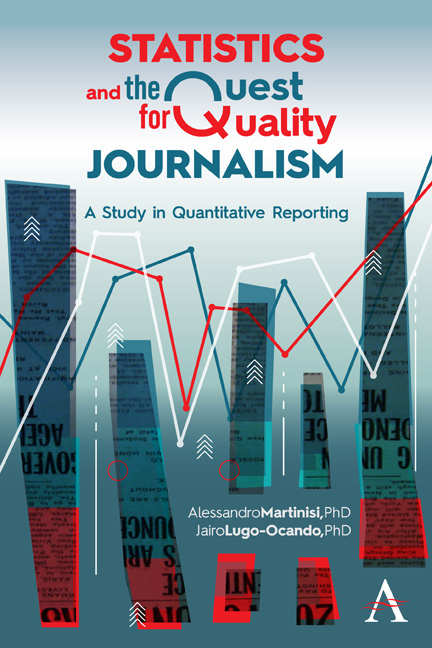Book contents
- Frontmatter
- Dedication
- Contents
- List of Illustrations
- 1 Introduction
- 2 Numbers as Information in the Information Society
- 3 The Never-Ending Debate on Quality in Journalism
- 4 Statistics in Journalism Practice and Principle
- 5 The Normative Importance of ‘Quality’ in Journalism
- 6 Journalism Meets Statistics in Real Life
- 7 The Ideology of Statistics in the News
- Epilogue
- References
- Index
5 - The Normative Importance of ‘Quality’ in Journalism
Published online by Cambridge University Press: 07 November 2020
- Frontmatter
- Dedication
- Contents
- List of Illustrations
- 1 Introduction
- 2 Numbers as Information in the Information Society
- 3 The Never-Ending Debate on Quality in Journalism
- 4 Statistics in Journalism Practice and Principle
- 5 The Normative Importance of ‘Quality’ in Journalism
- 6 Journalism Meets Statistics in Real Life
- 7 The Ideology of Statistics in the News
- Epilogue
- References
- Index
Summary
The assumptions that quality can be only asserted through numbers hold both within journalism and government. Particularly, as these numbers bring a sense of impartial and objective assessment to both formulate and evaluate policies. Moreover, at the centre of this assumption is the deep-rooted belief that statistics can bring about the type of scientific-based knowledge, transparency and trust needed to implement and analyse government policy. Nowhere was this more evident than during the Tony Blair-led New Labour government in the United Kingdom (1997–2001), when evidence-based policy became central to the way politicians sold their own agendas to the public (Hope, 2004, 2005). To be sure, the Command Paper released under the title Statistics: A Matter of Trust (1998) made it clear that
Quality needs to be assured. Official statistics must be sufficiently accurate and reliable for the purposes for which they are required. The production and presentation of official statistics needs to be free from political interference, and to be seen as such, so that the objectivity and impartiality of statistics is assured. (1998, p. 5)
In this sense, the UK Statistics Authority has adopted a structure broadly similar to that of the European Code, which sets out a number of high-level principles, each of which is further amplified by a series of more detailed practices (or ‘indicators’ in the European Code). Also, the UK Code of Practice for Official Statistics and the assessment programme that follows have been informed by, and are consistent with, both the UN Fundamental Principles of Official Statistics3 and the European Statistics Code of Practice.
According to Mark Pont, member of the board of directors of the UK Statistics Authority, the European Code has proved an effective basis for the international process of ‘peer review’ and ‘the Statistics Authority believes that a similar approach will provide a sound foundation for the Statistics Authority's quality assessment function’ (Code of Practice: 8). One of the strong points of the Code is its emphasis on the role of the user, and the need for statistical producers to consider the wider use that is – or may be – made of statistics. In addition to meeting specific policy needs within government, there is increasing demand by people working in research, academia and journalism for statistics in many aspects of social and economic life.
- Type
- Chapter
- Information
- Statistics and the Quest for Quality JournalismA Study in Quantitative Reporting, pp. 67 - 92Publisher: Anthem PressPrint publication year: 2020



